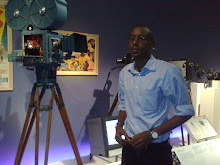
BY GLORIA I. ANYANGO
The Tribeca Film Festival, in New York City is one of the world’s biggest film entities and Rwanda’s very own Pierre Kayitana, is representing the Rwanda Film Festival.
Twenty three years old, Kayitana is working in the Youth Section of the Tribeca Film Institute. Together with a team of professionals in film and Media, he organises the youth screenings and programmes of the festival.
Under the mentorship of Tribeca’s very best like Brian Newman-CEO, Ellen Newman- Deputy Director, and co-founders and producers like Jane Rosenthal, Craig Hatkoff and Robert DeNiro, Kayitana is on a sure path to success.
Two years ago in 2007, Kayitana for the first time was honoured to be part of the Rwandan team that participated at this film festival.
Kayitana along with Gilbert Ndahayo a Hollywood filmmaker and Thierry Dushimirimana, a professional photographer all participated in the Film Fellows program-‘Three Voices’, a program that focused on Rwanda’s filmmakers.
Things got better for this team of young filmmakers when on the evening of the festivals’ ‘Rwanda Day’, President Paul Kagame presented a speech with a message of how Rwanda is healing itself through artistic expression, the good will of its people and the help of their government.
Along with other world leaders and film gurus like Bill Clinton and co-founder of Tribeca, Jane Rosenthal, the similarities between the Tribeca Film Festival and Rwanda film industry founded by Eric Kabera were emphasised.
The two were founded after tragedies where for Tribeca, it was the ‘September 11’ bombings of the World Trade Center while for Rwanda film industry it was the 1994 genocide against the Tutsi.
According to Kayitana, “The experience acquired from this tour, gave me the moral support and boost to aim even higher as I continue to better myself but also pass on the knowledge of film to my fellow Rwandans.”
Born in March 1986 in the Democratic Republic of Congo, (then Zaire), Kayitana was raised in a family of ‘technical minds’.
Growing up in a family that exposed him to the possibilities of ICT and business, he pursued his studies at Lycee de Kigali before joining Kigali Institute of Science and Technology.
In late 2005, Kayitana was one of the pioneers of the first Rwanda Cinema training centre. Here, they were trained on documentary filmmaking.
After this, his first film, ‘Behind these walls’ -a short story about Rwanda’s educational system, its progress and challenges was made.
Since then his strong passion for filmmaking developed and soared him to great heights. Working with both local and international filmmakers, doors opened that ushered him into the big world of film.
In the summer of 2006, he was part of the crew that produced the film, “Shake Hands with the Devil”, whose popularity is attributed to Romeo Dallaire’s testimony about the horrific reality of the 1994 Genocide.
As they say, “The rest was history”, opportunities like these generated more work for Kayitana as a production manager and coordinator of film projects.
As he grew in film, his expertise enabled him to work for international channels such as CNN, Aljazeera English, PBS, and Alicia Key’s organisation, ‘Keep A Child Alive.’
Eventually he learnt the ‘ins and outs’ of film business and management. Consequently in 2008, he coordinated ‘Pangea Day’- a global celebration of films and humanity event. Kigali was one of the five cities selected around the world to host ‘Pangea Day.’
Today, Kayitana is the Director of Rwanda Cinema Centre Film Festival. Together with his team, he is responsible for organising the country’s Film Festival. Slated for June 2009, the festival will be a major event.
“It is becoming increasingly common for businesses to incorporate multimedia elements into their operations,” he said, “…and with such growth, there is an exciting range of opportunities available.”
Through this, he wants to bring an innovative approach to the local ICT and film industry, by blending the best of art and technology as a way of maximizing all available possibilities.
All this he says has to be done while also thinking of the new changes in the global market. Through utilizing the conducive film making environment in Rwanda which offers zero tolerance to corruption, is ICT service oriented, has good governance and natural beautiful landscape, better films can be made that can compete in the global market.

No comments:
Post a Comment